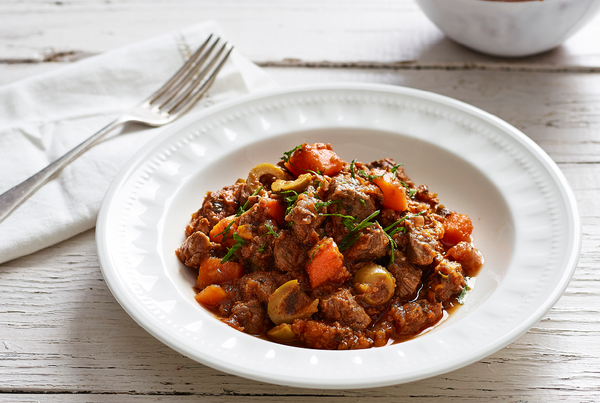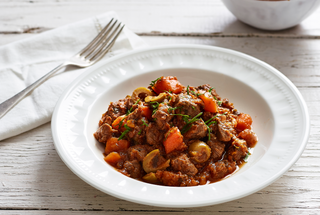
May is Mediterranean Diet Month, so we thought what better occasion than this to take a look and what it is, and what makes it so popular around the world.
What is the Mediterranean Diet?
While we call it the Mediterranean Diet, it actually originated as a lifestyle shaped by the notion that you ‘eat what you grow’, and it is one that celebrates seasonality, local produce and traditional preparations.
According to UNESCO1 it utilises ‘a set of skills, knowledge, rituals, and traditions for harvesting, fishing, conservation, processing, cooking and the sharing of food’ and has been praised as one of the most popular diets in the world2 with a vast number of studies highlighting its many nutritional benefits3
It first originated in the olive-growing regions of the Mediterranean and is based on a diet low in saturated fat and high in vegetable oils (low in omega-6 fatty acids and rich in omega-3 fatty acids) and has been commonly practised by those in Greece and Southern Italy post World War II. Updated versions of the diet have simplified it, defining it as a diet rich in vegetables, olive oil, whole grains, fish, fruits, moderate amounts of wine and dairy and limited amounts of red meat and processed sweets.
There is no one size fits all ‘diet plan’ when it comes to the Mediterranean Diet as variations exist to adapt to the individual country’s culture. Common themes which can be found are:
- Each meal should include plenty of vegetables, legumes, pulses and nuts.
- Include wholegrain bread and cereals with meals that are consumed whole with minimal processing (e.g. Oats, rice, barley)
- Olive Oil and olives are the main sources of fat. Other healthy fats can include avocados and avocado oil. These fat sources moderate the intake to maximise monounsaturated (healthy) and limit saturated (unhealthy) fats.
- At least 2 x servings of fish per week (include oily fish such as salmon, mackerel, canned sardines)
- Limit portion size of meat (beef, lamb, pork and chicken) and eat them less often (generally no more than 4-5 times a month)5
- Eat fresh fruit every day and dried fruit and nuts as snacks or dessert
- Moderate your consumption of dairy products, stick mostly to cheese (think feta *drool*) and yoghurt.
- Consume wine in moderation (one standard drink a day), always with meals if not contradictory to religious or social norm5
- Sweets and sugary goods should be saved for festivities and special occasions.
- Flavour with herbs and spices rather than salt
- Meals should always be centred around friends and families and enjoyed together
- Physical activity should also be incorporated into your lifestyle & yes, a walk around the block is a great way to start!
Why is it so popular?
The diet first came to light when a Swedish researcher found that coronary heart disease started to decline post-WWII, due to food shortages and restrictions on milk, butter, eggs and meat6. ew years later, the Seven Countries Study7 investigated a similar association between different food groups and coronary heart disease across you guessed it, 7 countries (USA, Finland, Netherlands, Italy, former Yugoslavia, Greece and Japan). What they found in the study was that a lower intake of animal products, higher intake of vegetables, legumes and moderate consumption of dairy led to lower rates of coronary heart disease by 16%, which mirrors much of the principles behind the Mediterranean diet.
Before you think, (yes finally!) bring on the wine and pasta, the diet is really a lifestyle overhaul which incorporates regular physical activity and should be enjoyed and shared with family and friends.
Dineamic and the Mediterranean Diet
At Dineamic we’ve taken a lot of inspiration from the Mediterranean diet and the approach to food it promotes. You can see it in our love for spices, fresh herbs and olive oil; our trust in only the best Aussie tomatoes; and ‘local wherever possible’ approach. These are important to us not only because of the health-factor, but also because we believe that good flavour begins with good ingredients.
Read more about healthy fats in Karen’s post here.
So there you have it. The ins and outs of the Mediterranean Diet. If you haven’t tried it already, why not try it in May for Mediterranean Diet month? Start small and work your way up, and remember that it’s as much about how you eat as it is about what you eat – if you would normally eat in separate rooms or in front of the TV, why not get the family together around the table, catch up and enjoy the meal together. Another way to get started might be by doing something as simple as switching your oil to Extra Virgin Olive Oil or tucking into some Greek Yoghurt with nuts instead of a chocolate bar in the arvo.
Tell us in the comments what your favourite Mediterranean Diet-inspired meals are & any tips you have for getting started with a Mediterranean Diet!
References
- Intangible Cultural Heritage. Mediterranean Diet Factsheet. 2013 <https://ich.unesco.org/en/Rl/mediterranean-diet-00884> Viewed 27 April 2018
- Dernini S, Berry E. Mediterranean Diet: From a healthy diet to a sustainable dietary pattern. Front Nutr 2015;2:15
- Martínez-González MA, Bes-Rastrollo M, Serra-Majem L, Lairon D, Estruch R, Trichopoulou A. Mediterranean food pattern and the primary prevention of chronic disease: recent developments. Nutr Rev (2009) 67(Suppl 1):S111–6
- Anastasios S. Dontas et al. Mediterranean diet and prevention of coronary heart disease in the elderly. Clinical Interventions of Aging. March 2007.
- Bach-Faig A, Berry EM, Lairon D, Reguant J, Trichopoulou A, Dernini S, et al. Mediterranean diet pyramid today. Science and cultural updates. Public Health Nutr (2011)
- Keys A. Coronary heart disease in seven countries. Circulation (1970) 41(Suppl I):211.
- Toshima et al. Global coronary risk in northern and southern Europe. The Seven Countries Study.1994.










